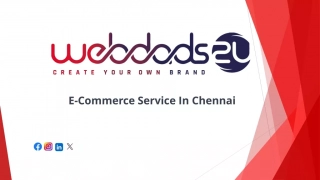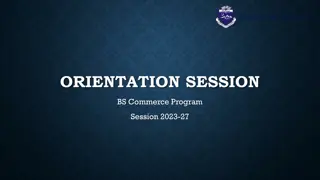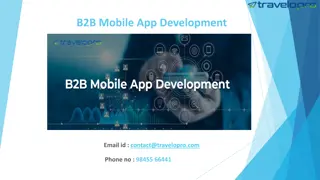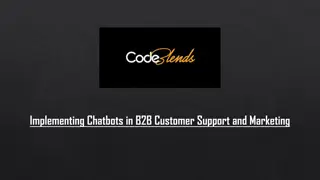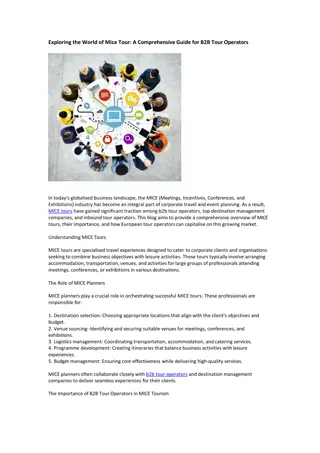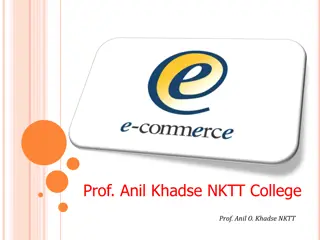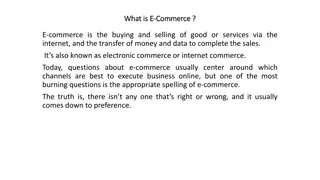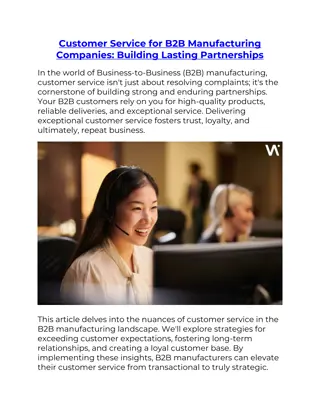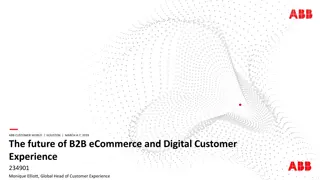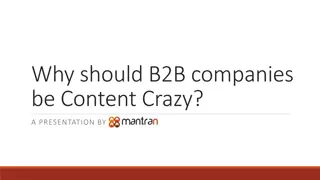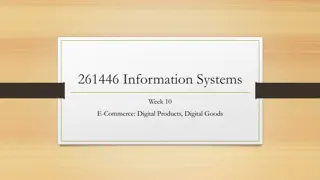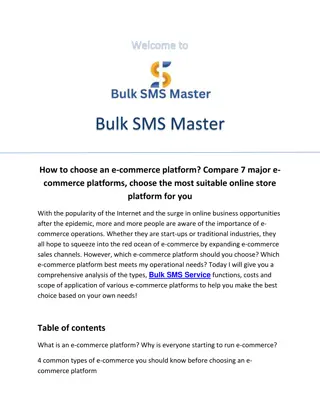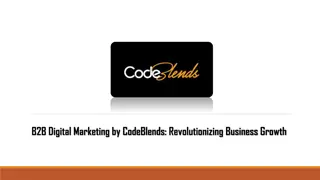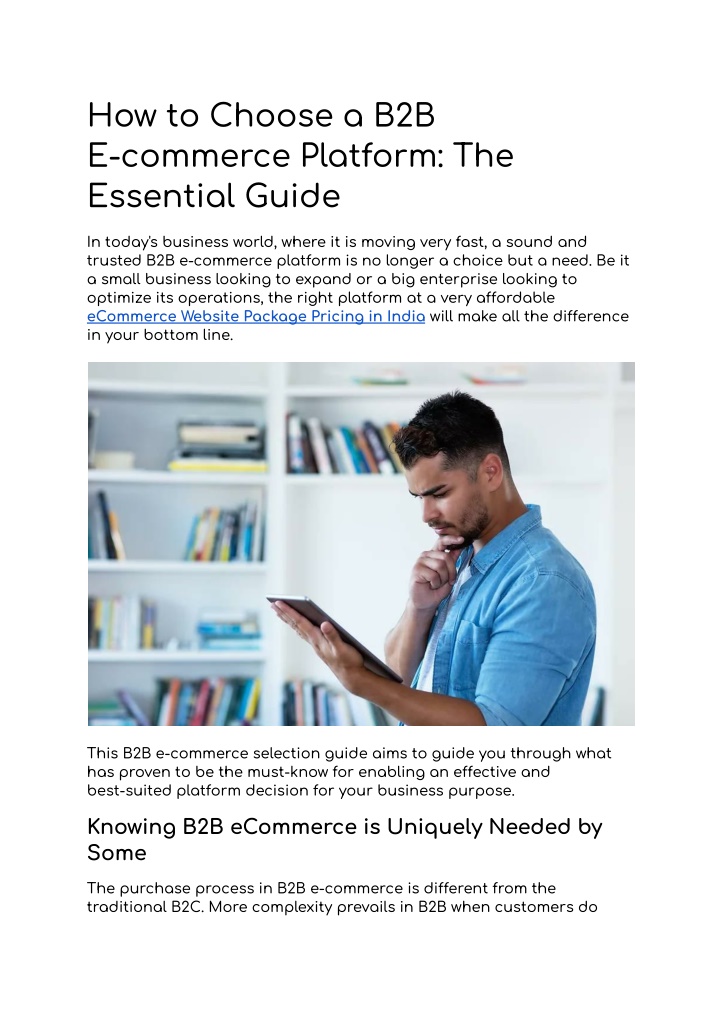
How to Choose a B2B E-commerce Platform_ The Essential Guide
In today's business world, where it is moving very fast, a sound and trusted B2B e-commerce platform is no longer a choice but a need.
Download Presentation

Please find below an Image/Link to download the presentation.
The content on the website is provided AS IS for your information and personal use only. It may not be sold, licensed, or shared on other websites without obtaining consent from the author. If you encounter any issues during the download, it is possible that the publisher has removed the file from their server.
You are allowed to download the files provided on this website for personal or commercial use, subject to the condition that they are used lawfully. All files are the property of their respective owners.
The content on the website is provided AS IS for your information and personal use only. It may not be sold, licensed, or shared on other websites without obtaining consent from the author.
E N D
Presentation Transcript
How to Choose a B2B E-commerce Platform: The Essential Guide In today's business world, where it is moving very fast, a sound and trusted B2B e-commerce platform is no longer a choice but a need. Be it a small business looking to expand or a big enterprise looking to optimize its operations, the right platform at a very a?ordable eCommerce Website Package Pricing in India will make all the di?erence in your bottom line. This B2B e-commerce selection guide aims to guide you through what has proven to be the must-know for enabling an e?ective and best-suited platform decision for your business purpose. Knowing B2B eCommerce is Uniquely Needed by Some The purchase process in B2B e-commerce is di?erent from the traditional B2C. More complexity prevails in B2B when customers do
huge orders, negotiate pricing, or some are recurrent. That requires an aspect where the platform specifically caters to business buyers with flexibility and scalability and also with high-quality integrations. Understand first what your business needs before the features of the platforms. Key Questions to Consider: What sales channels are in place, and how are they to be integrated? Do you need custom pricing, account-based purchasing, or multi-user access for customers? What volume of transactions do you handle daily, weekly, or monthly? How scalable should your solution be in the next 3 5 years? This will reduce options and will point attention towards the options that will be in alignment with the operational and strategic objectives. Top Features to Look for in a B2B E-commerce Platform This one is to choose features relevant specifically to B2B needs. Choose your platforms accordingly. Remember the following: Custom pricing and catalogs Most B2B companies negotiate prices and adapt product catalogues to each customer. An o?ering has to support account-specific pricing and enable the generation of a customized catalog. Advanced Search and Navigation Most business buyers know what they want and expect to find it now. Advanced search capabilities, including filters, categories, and SKU-based searches, will be necessary for a seamless experience. Bulk Order and Reorder Most B2B sales are in bulk form. The website should support multi-orders, and the repeat order process should be flexible for the customer. Integration Capabilities
It must be able to integrate itself without being intrusive to any other system at your workplace from ERP or CRM to the inventory system. Scalability E-commerce requires growth according to the business. The application needs to support increased traffic and products but not degrade with multiple transactions. Mobile Responsiveness Most of the purchases done via mobile are by business buyers. Therefore, a responsive design facilitates smooth usage on any kind of device. Excellent Safety Prime importance is given to protecting sensitive business data. Look for sites that have a strong encryption feature, a payment gateway, and maintain industry standards like PCI DSS. Analytics and Reporting It should also portray sales performance, customer behavior, and inventory trends in detail on a good platform. Data-based decision-making is the lifeblood of your enterprise. Compare Top B2B E-commerce Marketplace Having discussed the key things to look for in B2B e-commerce platforms, let's move on to some of the most popular ones and their strengths. Magento Commerce (Adobe Commerce) Magento is one of the most flexible and highly customizable e-commerce solutions available. It is perfect for businesses that need specific features. The advanced B2B features it includes include catalog customization, pricing, and account management. Highly customizable, has great community support, and extensive integrations. Cons: requires technical expertise and can be costly to maintain. Shopify Plus Shopify Plus is an all-powerful and in-one great product for business users who are searching for an easy-to-use platform. It includes
features like bulk pricing, multi-storefronts, and even custom checkout experiences. Pros: It is easy to set up, scalable, and excellent customer support. Cons: Not as customizable as other platforms. BigCommerce B2B Edition BigCommerce has the best out-of-the-box B2B features that would include features like bulk pricing, quote management, and API integrations. It would therefore be very appropriate for mid-sized businesses. Pros: flexible, cost-e?ective, robust integrations. Cons: It may require additional extensions for further functionality. OroCommerce OroCommerce is B2B e-commerce developed with feature-rich capabilities for complex workflows. Hence, it is very suitable for manufacturers and distributors. Advantages: B2B-focused features, workflow configurable, and strong ERP integration. Disadvantages: more difficult learning curve; fewer third-party plugins. WooCommerce (with B2B Plugins) If you re running a WordPress site, WooCommerce with B2B plugins can be a cost-e?ective option. While it s primarily a B2C platform, plugins like B2BKing can add necessary functionality. Low-cost, easy to use, and a very rich library of plugins. Not scalable for large businesses. Customization versus out-of-the-box solutions The most important of all would be a platform that is out-of-the-box-ready, either to deploy or gives out the maximum scope of the degree of customization. Out-of-the-to-give platforms
For organizations that require simple, unflashy e-commerce solutions with relatively moderate budgets. Faster to implement and administrate. Lacks flexibility regarding advanced features and integration. Customizable platforms These are more suitable for the kind of businesses that have specific workflows and feature requirements specific to them. It is somewhat more time- and resource-demanding in terms of its implementation. It gives flexibility and scale to view long-term. Total cost of ownership TCO Although the initial cost of a platform is a big deal, consideration should be given to the total cost of ownership that entails. Licensing fees Hosting and maintenance costs Development and adaptation costs Ongoing support and upgrades Now, calculate these costs over a period of 3-5 years to get a proper view of your investment. The importance of vendor support Having selected the right platform is half the battle; the real test comes in the support from the vendor on an ongoing basis. So, look for the following in your chosen platform: 24/7 Technical Support Proper documentation, and training material. Good and strong user and developer community That ensures that the growth of a given business leads to the amplification and improvement of its platform about reliability and efficiency. Testing and Implementation Before investing in a platform, it is always advisable to test its functionality by taking a demo or a trial period. Engage key stakeholders from sales, IT, and operations to evaluate the performance of the platform. Once you ve made your choice, develop a detailed
implementation plan that includes: Data migration Integration with other systems Sta? training and customer onboarding Proper testing and implementation minimize disruptions and set the stage for long-term success. Conclusion Choosing the right B2B e-commerce platform is an important decision that needs thoughtful consideration of your business's unique needs, growth plans, and budget. The focus should be on core features, assessing which of the options is in more demand, and planning for implementation which will help you gain a suitable platform for your present needs, potent enough for tomorrow. By doing so using the right tools for it, then your business would be set up for spectacular success in the competitive landscape of B2B e-commerce. Also Read: Why Hiring an eCommerce Developer Could Be The Best Decision for Your Online Business?

